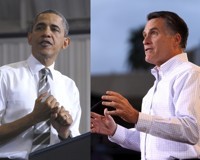Editor's note: Ulrike Guérot's the Continentalist column will return next Monday.
With the U.S. presidential campaign entering the home stretch, it is already evident that foreign policy will not play a major role in the election outcome. As the third and final presidential debate highlighted, the foreign policy discussion has ignored wide swathes of critical issues, including how to respond to China’s rise and the resulting shifts in Asia’s regional balance of power; how to re-establish America’s relevance in an increasingly self-reliant Latin America; how to penetrate Africa’s promising but increasingly competitive economic landscape; and how to balance America’s lingering commitments in the Middle East with its broader global interests -- all amid newfound constraints on available resources.
Both President Barack Obama and Republican nominee Mitt Romney have pledged their allegiance to the guiding national faith of American exceptionalism. And while both have acknowledged the ways in which the global landscape has changed in the past decade, they have also assured voters that the U.S. will continue to play the essential role in global affairs that has it has exercised since the end of the Cold War. The differences between the two candidates have instead boiled down to how best to deploy American power, with Obama highlighting his administration’s emphasis on building partnerships and Romney relying mainly on the rhetoric of American primacy.

